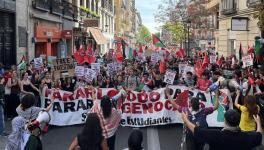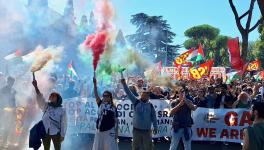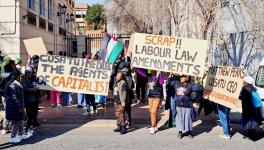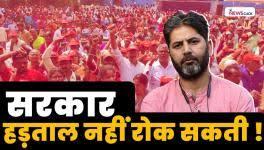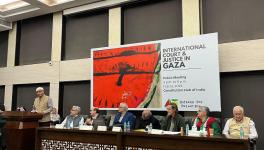Historic General Strike in South Africa Sees Workers Raise Issues of Corruption, Job Loss
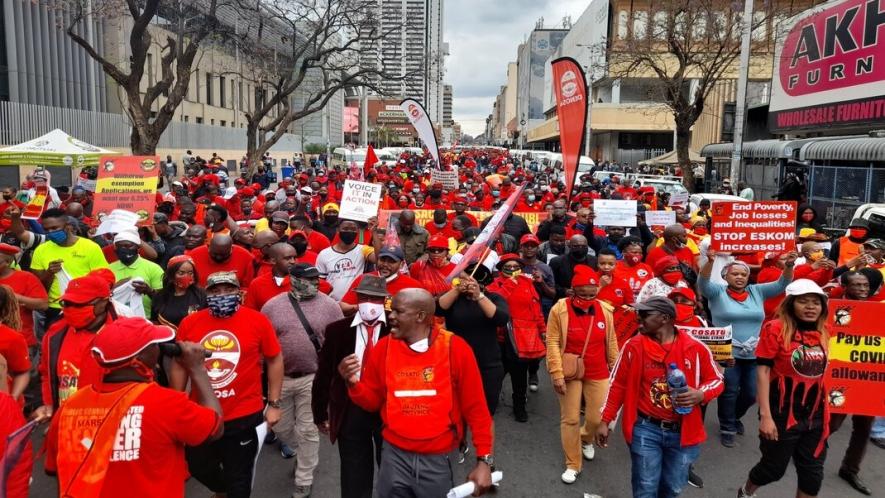
Image Credit: Twitter
Demonstrations and pickets were held in numerous cities and towns across South Africa on Wednesday, October 7, as part of a historic general strike. Across the country, workers marched to government offices, provincial legislatures, municipalities and police stations to submit memorandums.
Corruption, job losses, failure to provide safe transportation during the pandemic and the government’s refusal to honor the wage agreement it had signed with public servants are among the specific issues workers raised.
The strike action was called by the Congress of South African Trade Unions (COSATU), a traditional ally of the ruling African National Congress (ANC). With a membership of 1.8 million, it is the largest trade union confederation in the country.
The strike is also a political challenge to the ANC, whose neoliberal policies have been identified as the root cause of the grievances workers are facing. The government stands accused of open collaboration with big capital, to protect whose interests it is consciously shifting the burden of the crisis on to the shoulders of the working class, through its austerity policies.
The left-wing South African Federation of Trade Unions (SAFTU) — which is the second largest federation with a membership of around 800,000 — and the third largest Federation of Unions of South Africa (FEDUSA) also joined the action by mobilizing most of its affiliated unions.
“We will have an estimate of the number of workers who participated from different sectors by tomorrow. But we can say now that we are very happy with the participation. What makes us especially happy is the enthusiasm with which other trade union federations have mobilized,” COSATU’s national spokesperson, Sizme Pamla, told Peoples Dispatch.
“Considering what is at stake, different unions are setting aside their differences and have come together to lay the foundation for class unity. It is on the basis of this foundation that class war, which has been forced upon us by the government, which is cynically collaborating with big capital, will be fought,” he adds.
In the capital city Pretoria, workers represented by COSATU gathered at Burgers Park and marched to the office of National Treasury, which had refused to allocate the funds needed to finance the pay rise this year. The funds had been promised to public servants in the 2018 wage agreement.
In their memorandum, they also demanded a thorough investigation of over-priced tenders through which millions from the COVID-19 funds were stolen. These funds were meant to protect the health and livelihoods of workers under the pandemic.
Workers insisted on the arrest and prosecution of the politicians and businessmen who have been accused of corruption. The rally then proceeded to the Labor department.
SAFTU led a separate rally to the Union Buildings in Pretoria, which is the seat of the central government.
In Durban, SAFTU led a rally, first to the Office of Public Protector, and then to the Office of the Premier of the provincial government of KwaZulu-Natal. The premier also received another memorandum from COSATU which had also led a separate rally to his office.
In Johannesburg, the business hub of the country, SAFTU’s demonstration outside the Gauteng legislature was also joined by its affiliate, the National Union of Metalworkers of South Africa (NUMSA), which is the single largest trade union in the country, with a membership of 320,000.
NUMSA had split from COSATU in 2014, and played a key role in the formation of SAFTU in 2017, as a left union confederation opposed to the ANC. Although NUMSA did not participate in the strike, its members carried union flags to SAFTU’s demonstration.
In the meantime, a separate rally was led by COSATU from the COSATU house to Mineral Council SA head office, which was joined by SAFTU protesters later in the day.
“It is high time for COSATU to break ranks with ANC”
“This is the first time SAFTU and COSATU, have come together on a joint platform to defend the interests of the working class,” SAFTU’s national organizer, Lebohang Phanyeko, told Peoples Dispatch.
This strike, he says, is a “truly historic” labor action, which has brought home to both SAFTU and COSATU the pressing need of cultivating “maximum unity, despite our ideological differences.”
“But it cannot simply be a cosmetic unity. That unity has to come from the ground through struggles such as these,” he says, adding that by joining COSATU in this strike, SAFTU has demonstrated its willingness.
SAFTU’s participation, he said, is also a message to COSATU that it is time to break its enduring alliance with the ANC, which it has now come to rightly identify as a “class collaborationist” party. Only then, he contends, can a genuine unity of the working class be formed, independent of the ruling elite.
Pamla had told Peoples Dispatch earlier that “We don’t have the mandate to abandon the alliance that was affirmed in (our) 2017 conference. But in our next conference, we will debate the meaning of this alliance. That will be a central question.”
But Phanyeko maintains that “workers will not wait for two years till COSATU’s next conference. The leadership should call a special conference to debate this issue on a priority.” This strike action, he contends, has given COSATU’s leadership the mandate to hold such a conference.
Now that COSATU itself has reassessed the class character of ANC, Phanyeko argues, there should be no delay in breaking ranks with the ruling party in order to bring the working class organizations together as a united force.
This article was first published in Peoples Dispatch.
Get the latest reports & analysis with people's perspective on Protests, movements & deep analytical videos, discussions of the current affairs in your Telegram app. Subscribe to NewsClick's Telegram channel & get Real-Time updates on stories, as they get published on our website.











